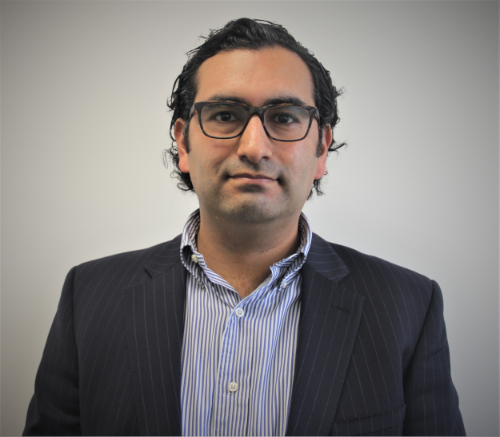Advisory Board

Professor Michael Barkham
Michael Barkham is a Professor of Clinical Psychology at the University of Sheffield and has carried out research on the processes and outcomes of psychological therapies for the past 40 years. He has a commitment to broadening the evidence base for the psychological therapies by complementing pragmatic trials with analyses of very large practice-based data from routine clinical settings. He has been involved in the development of the family of Clinical Outcomes in Routine Evaluation (CORE) measures and more recently in the development of a measure of Recovering Quality of Life (ReQoL). He is a past joint editor of The British Journal of Clinical Psychology and a Fellow of the British Psychological Society.

Dr. Jaime Delgadillo
Dr Delgadillo is a Lecturer in Clinical Psychology at the University of Sheffield. He also leads a clinical research team at RDASH NHS Foundation Trust, where he practises as Cognitive Behavioural Therapist. His clinical interests are in the treatment of depression, anxiety and addiction problems. His research applies precision medicine methods (e.g. advanced diagnostic, monitoring and prognostic technologies) in mental healthcare, aiming to improve patients’ response to treatments available in the NHS. He has led the development and implementation of personalised care technologies in NHS psychological services, for example the IAPT outcome feedback system proven to improve depression treatment outcomes (https://doi.org/10.1016/S2215-0366(18)30162-7).
Publications:
https://www.sheffield.ac.uk/psychology/staff/academic/jd-all_publications

Professor Steven Hollon
Steven D. Hollon, Ph.D. is the Gertrude Conaway Vanderbilt Professor of Psychology at Vanderbilt University. His research focuses on the nature and treatment of depression with an emphasis on the enduring effects of psychosocial treatments. He is a former editor of Cognitive Therapy and Research, past president of the Association for Behavioral and Cognitive Therapies (ABCT) and the Society for a Science of Clinical Psychology (SSCP), and the former chair of the steering committee advising the APA on the development of clinical practice guidelines. He is the recipient of awards for Distinguished Scientific and Distinguished Professional Contributions to Clinical Psychology from the Society of Clinical Psychology of the American Psychological Association. He has over 300 publications and has mentored over 20 doctoral and post-doctoral advisees. He has (along with colleagues) established that cognitive therapy is as efficacious as and more enduring than antidepressant medications and that the same can be said about the simpler (but not simplistic) and more purely behavioral activation. His studies have suggested that the specificity of treatment response is heavily moderated (only patients with more severe depressions show a “true drug” response relative to placebo and the same appears to be true for psychotherapy) and that change in underlying core beliefs appears to mediate the enduring effects found for cognitive therapy.
His recent work has extended the efficacy of behavioral activation to low and middle-income countries and he has become increasingly interested in recent years in the possibility that depression is an evolve adaptation that serves a useful function. If so then antidepressant medications may suppress symptoms at the expense of prolonging the underlying episode and cognitive therapy may more directly facilitate the evolved adaption function of depression to resolve complex interpersonal issues in an evolutionary context. These issues have guided his most recent research endeavours.

Dr Shehzad Ali
Dr. Shehzad Ali is an Associate Professor of Public Health Economics at Western University (Canada). He is also Visiting Associate Professor of Health Economics and Health Services Research at University of York, Heidelberg University (Germany) and Macquarie University (Australia). He holds a PhD in Social Policy (Health Economics, York), MSc in Medical Statistics (Leicester) and Masters in Public Health (Leeds).
With several grants funded in the UK (National Institute of Health Research, NIHR), USA (Agency for Healthcare Research and Quality, AHRQ) and Australia (National Health and Medical Research Council, NHMRC), Dr. Ali has led research in the areas of public health economics, health services research and health technology assessment. He has published research in leading journals in the fields of Medicine (e.g. the Lancet); Health Economics (e.g. Health Economics; Medical Decision Making); Health Policy and Health Services Research (e.g. Health Policy and Planning; Social Science & Medicine); and Applied Public Health (e.g. Obesity; Addiction). He is also an Associate Editor of the British Journal of Psychiatry.
Dr. Ali’s research focuses on the following four areas: (1) Health services performance evaluation in terms of efficiency and equity of access, utilization and patient outcomes using patient-level linked administrative data (“big data”) and population surveys; (2) Economic evaluation for health technology assessment and evidence-based decision-making, both in developed and developing countries; (3) Evaluation of small and large-scale interventions/policies delivered at patient, provider or population-level, using observational and randomized evidence; and (4) Elicitation of value judgments and treatment preferences to inform resource allocation.
Dr. Ali’s has held a number of leadership positions, including Health Economics Lead at the Canadian Agency for Drugs and Technologies in Health (CADTH) and Lead Health Economist in the Mental Health Research Group at University of York, UK. He was also the Dean of Derwent College at University of York until 2012. Dr. Ali has provided leadership on projects funded by the Department for International Development (DfID, UK), German Corporation for International Cooperation (GIZ), UNICEF and Save the Children. Also, as National Program Manager with the Aga Khan Development Network, he led a multidisciplinary team in Central Asia on projects funded by the World Bank and United Nations.
With a strong track record of scholar-practitioner partnerships, Dr. Ali’s research has focused on policy-relevant questions. Examples of research with direct impact on practice include: (a) Health Equity Performance Indicators which were adopted by NHS England to monitor and reduce potentially avoidable inequalities; and (b) Empirical evidence to inform the largest evidence-based patient case management information system (PCMIS) in England which has been used by >12,000 psychotherapists for 2 million referrals.

Dr Elisa Aguirre BSc, MSc, PhD
Dr Aguirre is a Clinical Health Psychologist working at North East London Foundation Trust, Improving Access to Psychological Therapies services and the Research and Development Department. She completed her PhD in 2012 at UCL and she has been combining her clinical and academic work since 2015.
Her clinical interests are in relation to positive outcomes for people with common mental health disorders and its relationship with physical health outcomes including cognitive health. Her research combines quantitative and qualitative methods and primarily focuses on the development and evaluations of psychological interventions and eHealth platforms including Outcome Feedback to predict and prevent poor treatment outcomes and to optimise patients mental and physical health.

Victoria Fussey
Victoria is a Senior Advisor in the Health Team at the Behavioural Insights Team. Victoria works on a range of policy areas at BIT, including the NHS, public health and mental health. Recently, Victoria ran a large randomised controlled trial including more than 17,000 patients from six IAPT services to test the application of behavioural insights to support those on waiting lists for treatment.
Prior to joining BIT, Victoria worked at the Department for International Development on health services in developing countries and at the Department of Health on the development and implementation of public health policy. She holds a master’s degree in Public Health from King’s College London and a BSc in Psychology from the University of Leeds.”

Professor Gerome Breen
Professor Breen is a psychiatric geneticist from the Institute of Psychiatry, Kings College, who works on the genetics of affective (mood) disorders. One of the most important goals of his research is to discover the biological basis of common psychiatric disorders which will not only allow biomarker studies in mental health, but which can also be used to improve estimations of response to psychological treatment. He is heavily involved in a number of international genetic consortia which are driving the field of psychiatric genetics forward at a faster pace than ever before, with more than 500 variants for common psychiatric disorders recently discovered.
Professor Breen is currently running the Genetic Links to Anxiety and Depression or GLAD study with close collaborator Professor Thalia Eley, and leads the NIHR Mental Health BioResource, of which GLAD is the first study, and which aims to recruit >100,000 participants in the next 5 years.

Tuvi Orbach
Tuvi is a serial entrepreneur with a proven track record in establishing and growing successful international companies. His main purpose and focus is to develop effective innovative and scalable solutions integrating advanced science and technology to answer unmet needs and improve millions of people’s lives.
The first company Tuvi established, ‘Sapiens International’, has a current market capital of more than $850m. When Sapiens went public he sold his shares to invest his time and money in the research and development of solutions for improving mental health. His team developed the first computerised cognitive behavioural therapy which was recommended by NICE for anxiety and depression in the NHS. Later, he established ‘ToHealth’ to assess and prevent long term conditions. ToHealth screened more than 250,000 NHS patients. He sold ToHealth to focus on ‘MindLife’ and develop the next generation of solutions to improve the wellbeing of individuals and society.
Tuvi has invented many innovations with patents granted in many countries. His latest innovation, ‘an Intelligent Personalised Trusted Digital Advisor and MatchNeeds Navigator’ was granted recently.
His first formal academic degrees were in Physics and Industrial Engineering. He later gained a masters in Information Technology and MBA. While working with leading psychologists and psychiatrists and developing computerised psychological solutions, he studied and researched psychology. Later, during managing and developing ToHealth, he researched and learnt about assessment and prevention of long term conditions.
